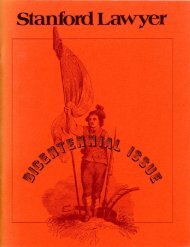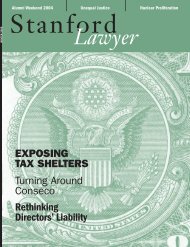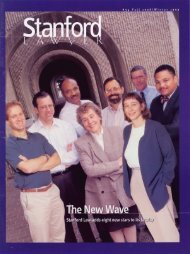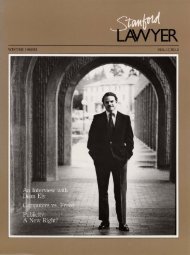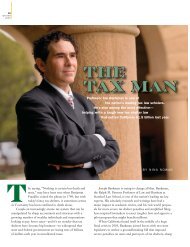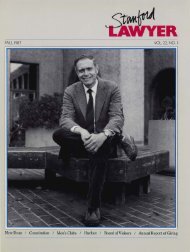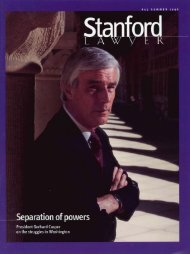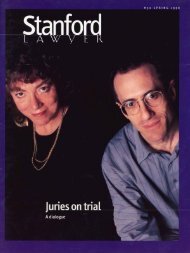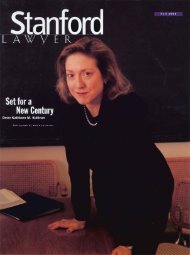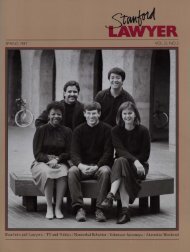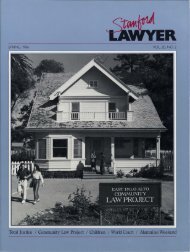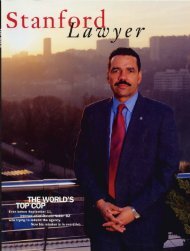Restoring the library after the Lorna Prieta earthquake; swinging from the hip at a faculty/student softball game; bidding at a SPILF auction.Library. ext, <strong>Stanford</strong> was forced to undergo a painful andprotracted series ofbudget cuts, after the federal governmentinvestigated the <strong>University</strong> for alleged overcharging relatedto research costs. The Law School was told to expect budgetreductions of 10 percent or more-about $1.5million.By the time Brest sent his fifth letter toalumni, in 1991, the Law School was clingingprecariously to its position in the top tier ofpremier institutions. Faculty salaries were nmning20 to 30 percent behind peer schools, someofwhich were poised to begin stealing <strong>Stanford</strong>'sstars. Student loan burdens, exacerbated by saggingfinancial aid hmds, had risen to alarminglevels. Curricular initiatives, including the fledglingbut promising Law and Business program,were threatened by a mandatory cap on facultyhiring. It was time to be hlunt."Your law school is in peril," Brest wrote."I'm writing now to tell you that our achievementsand our future are in jeopardy." It was notexactly a conventional approach to fund-raising,but it was illustrative of what would become aBrest trademark: substance over style, candorover coyness. His sincerity won over alunmiand the dollars began pouring in. As of thiswriting, gifts and pledges to the School's campaigntotaled more than $88 million, and alumnigiving had risen from 28 percent annually toalmost 40 percent."The credit for this extraordinary fundraisingsuccess lies squarely and personally withPaul Brest," said Dean-designate KathleenSullivan. "He devoted himself to tirelessly andceaselessly criss-crossing the country, reachingout to Law School alunmi and friends.""Paul Brest has been,for the I 2 years ofhisdeanship, one ofthegreat inspi'ringfiguresin Ame'rican legaleducation. He has ledthe way toward amore supportive1relationship betweenthe legal academyand the pmcticing bar,and has helped lawteache'rs eve'rywhereundentand the novelchallenges they face ina p'rofession - in aW01rld - that ischanging in suchd'ramatic ways. It hasbeen my gnatprivilege to wO'rk withPaul on a va1riety ofcollab01rative p'rojects,and I salute him forhis lasting cont'ributionto Stanfo'rd LawSchool and to legaleducation genemlly. "ANTHONY KRONMANDean, Yale Law SchoolImportantly, according to Sullivan, Brest's interest inalumni went far beyond raising dollars. "He did not simplysolicit their gifts," she said. "He engaged them in wide-rangingdialogue about the mission ofthe Law School, the futureofour profession, and the intersection oflegaldisciplines with the worlds ofbusiness and publicpolicymaking."There probably is no one thing for whichBrest will be remembered-his shadow is longand his achievements diverse-but his successin returning the Law School to sound financialfooting unquestionably has etched his nameamong the key figures in <strong>Stanford</strong>'s history.WHENHE ASSUMED the deanshipin 1987, Brest was a respectedprofessor who, like his predecessor,John Hart Ely, already had assembled adistinguished career as a constitutional lawscholar. He had experience with curricular reformand some otl1er administrative matters, butadmittedly knew virtually nothing about fundraising.Some wondered whether his low-keystyle would be an impediment to attractingdonors. Brest agrees that the reservations werelegitimate. "I would have been skeptical aboutme," he said.Brest's longtime assistant Nancy Strausserrecalls that, early in his deanship, Brest hadhmd-raising staffliterally script what he wouldsay in certain situations. "It was hard in thosedays to keep him at a social function longenough to see the people he needed to see," shesaid. "His main interest was seeing how quicklyhe could get back to his computer."Strausser says part of that reticence was
ased on a lack offamiliaritywith the people withwhom he was expected to build relationships."Twelve years ago he didn't know these people;now they're his friends," she said.Typically clad in corduroy trousers and HushPuppies as a professor, Brest quickly realized hiswardrobe, too, would have to change. Strausser recallsa day Brest trudged past her muttering, "I'mgoing to buy a suit-Barbara says I have to."Barbara was Barbara Babcock, Brest's racquetballpartner who was tired ofshortening their court timeso he could make his frequent trips to the drycleaners to retrieve his one suit. "I asked him whenhe returned from shopping what color he picked,"Strausser said. "He answered, 'suit color.'"When confronted with the fiscal crisis earlyin his tenure, Brest underwent a kind of cramsession in fund-raising, assisted by Harvard developmentdean Scott Nichols. "I flew toCambridge and sat down with Scott, and said, 'Idon't know exactly what we're supposed to be doing,but I know we aren't doing it right,'" Brestsaid. He returned to <strong>Stanford</strong> and began a searchthat resulted in the hiring of former AssociateDean for External Relations Susan Bell. She andBrest assembled a fund-raising staff, recruited formerchair ofthe <strong>Stanford</strong> Board ofTrustees,]amesGaither '64, to spearhead the campaign, and setinto motion a five-year, $50 million capital drive.Many people, citing historical fund-raising levels-theSchool had never raised more than threemillion dollars in any year-figured Brest would be lucky toraise half that much.Asking for money did not come naturally or easily forBrest, but ask he did. "I can remember the first time I askedfor what then seemed like a major gift-one thousand dollars,"Brest said. "It seemed like such a strange thing to do.""Paul hasmobilized andinvolved thealumni andfriendsofthe School inways unimaginableIO or I I years ago.He has recruited afaculty second tonone in thecountry, with agroup ofnewprofessors that isthe envy ofeverymajor law school inthe country. And hehas built thatquality while at thesame timeassembling the mostdiverse facultyofany leadinglaw school in thecountry."JAMES GAITHER '64Partner, Cooley Godward;former Chair, <strong>Stanford</strong> Boardof Trustees;Chair, Campaign for<strong>Stanford</strong> Law SchoolBREsT's SOFT-SPOKEN, gracious manner belies a steelyresolve. This is a man who spent two years inMississippi, at the height of the civil rights movement,working with the NAACP Legal DefenseFund to desegregate local schools. Itwas a scaldingbaptism for an idealistic young lawyer interestedfirst in "doing good."The lines during the civil rights movementwere clearly drawn and the parties easily dividedinto good guys and bad guys, he says. Theworld has become more complicated, and all ofhis experience since then, he says, including ayear as clerk for Justice John Harlan on theSupreme Court, has helped him learn how todeal with the myriad issues about which reasonablepeople can reasonably disagree.Those experiences also added layers toBrest's skin, and he has needed them. Despitethe faculty's widespread respect and affection, hehas faced difficult confrontations with studentsrelated to minority hiring and tenure decisions,in particular. They have been stressful and, insome cases, hurtful, he acknowledges, but also educational."I've learned how to learn from my mistakes,"he said. "I think I've become a betterproblem solver [as a result of the difficulties]."If Brest has an ego, it's hard to spot. Hetold Strausser early on that "you don't need to protectme from anybody," she recalls. Hiswidely advertised "open-door policy" was justthat-the side entrance to his office was nearly alwaysopen, and the invitation to enter was genuine,even if many people, respecting the officeand Brest's privacy, usually came through the mainoffice. Still, Strausser says, the policy meant something, ifonlysymbolically. "People knew he was accessible," she said.Faculty noticed. ProfessorJohn Donohue, the John A.Wilson Faculty Scholar, says of Brest: "He has been an immenselyvalued role model of the committed academic whocontests intellectual issues with a passionate engagement andlaserlike rigor, but with a degree ofgenerosity and humanitythat is extraordinarily rare."Gerald Gunther agreed. "... Throughout, he has remaineda thoughtful scholar, a wonderful, sensitive human be-IF BREST HAS AN EGO, it's hard to spot. His "open-doorpolicy" was justthat-the side entrance to his office was nearlyalways open, and the invitation to enter was genuine.\ TAN I () It I) I. A W V f. It ED




